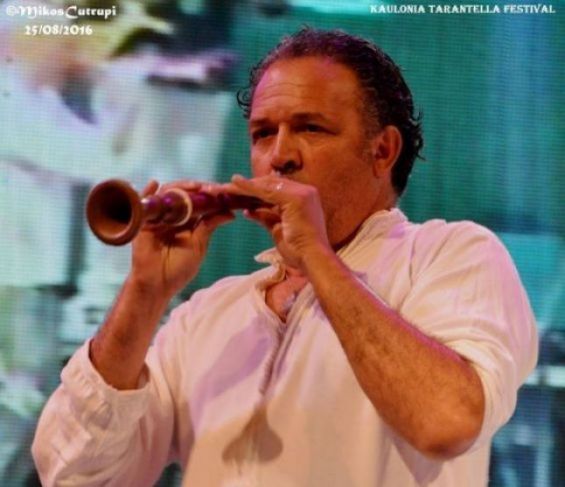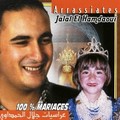«Basically, I am a street musician and I will always remain one on the inside». This is how Nour Eddine Fatty modestly summarizes his journey as a Moroccan musician in Italy. He was fascinated with music since the age of six and he was able to have his own style, getting inspired by several cultures.
He left Morocco for Italy in 1993, as an irregular migrant, to become today a reference in the music and movies industry and a virtuoso in the Vatican. He is now a famous figure in Europe and in the Middle East.
Born in Zrizrat, a village near Ouezzane, Nour Eddine grew up in the city and spent his childhood there before immigrating to Italy. He learned to play the flute when he was 6 years old. «My grandfather, Maalam Ahmed Ben Redouan, from the Aissaouia brotherhood, was a great Ghaita master. Without him attending, Sheikh El Kamel’s moussem in Meknes would not start, because he was a reference of the Aissaou music in northern Morocco. I come from an Aissaoui tribe and that is why music is in my genes», he told Yabiladi.
«When I was young, my grandfather made me flutes. At the age of eight, I used to accompany the herd with my instrument. It’s the same one I kept with me until I left for Italy. I remember playing it in concerts in Florence, Venice and the most beautiful tourist sites in several countries».
Once in Rome, the musician was amazed by «the beauty of the country and the goodness of its inhabitants». He then decided to melt in, discovering the culture, learning Italian and working as a farm worker in vineyards and olive groves. «It was hard to afford daily needs and rent», he recalls. Once his shift at the fields finishes, he starts rehearsing before performing at metro stations in the Italian capital.
At some point, Nour Eddine realized that his flute did not have a great musical impact on passers-by. He then decided to buy a guitar that he used, after receiving a textbook on the basic musical notes from a church. This new instrument was accompanied by Arabic songs, with Andalusian, Calabrian and Sicilian rhythms. «It is a common Mediterranean heritage that brings us together», the artist explained.
Shortly after, Nour Eddine Fatty decided to devote himself entirely to perfecting his flute, guitar, but also lute and percussion playing. He used to perform, on a daily basis, in metro stations eight hours a day, creating friendly relations with residents.
From the streets of Italy to European theaters
After three years of full-time street music, Nour Eddine Fatty managed to improve his performances. He was able to work on his voice, the harmony between his songs and his playing, all while developing an artistic charisma.
Near the subway, he was spotted by Italian musician Tony Esposito, who heard him singing in Arabic. He then asked him to help him create a soundtrack for «Storie d'amore con i crampi», a movie shot in Tunisia by Italian filmmaker and playwright Pino Quartullo.
«It was my first time in a studio. He was so pleased with my work. We co-created the soundtrack of the album, where I played the lute and percussion. It was the start of my career».
The soundtrack was so original that Nour Eddine Fatty was distinguished by the Luce Institute. He also received several awards in film festivals, starting a career in the Italian music industry. His music was used in six films that marked the history of the Italian cinema industry in the 1990s.
Nour Eddine Fatty then started composing music on his own for film producers. His work attracted musicologists, intellectuals and researchers. Working independently, he got invited to concerts in the most beautiful scenes in Italy, such as the Auditorium Parco della Musica.
Music as a key to coexistence
From 1997 to 2013, Nour Eddine Fatty released 13 records, five of them were typically Moroccan. As for other albums, they were a fusion between the music of his country and Jazz, Tarantella, Arab-Andalusian and North African music.
After the 9/11 attacks, he released an album entitled Coexist, mixing Jajouka music and the Aissaoui melodies, he learned from his grandfather, with Sephardic sounds and techno music.
«These types of music embodied coexistence, they were a representation of life in a common society despite the differences. After the September 11 attacks people changed their ideas about Muslims and the Arab culture. I made this album, working with Jews and Christians».
Taking a philosophical dimension, the album attracted the attention of the Italian media. Its author was interviewed by radios and televisions in the Vatican. «In 2005, Pope John Paul II, at the time, organized a big concert in the Vatican auditorium to convey a message of peace and I was the main guest. My efforts to convey a message of coexistence in society were recognized», recalls Nour Eddine.
Distributed worldwide by Universal, Coexist was widely sold in Italy, France, Spain, Germany, but also in the UAE and Turkey. An eponymous piece in this album, a track is selected by Benedict XVI for the official Vatican playlist.
Building a bridge
Far from being disconnected from the musical scene in Morocco, Nour Eddine Fatty considers that «there are young people today who make very interesting musical productions, which must be encouraged and accompanied in a professional manner». In this sense, he says he designed in 2009 a film where he follows several talents of the new Moroccan scene, including H-Kayne, Fnair, and young rappers and musicians in their first steps.
Nour Eddine Fatty also aspires to perform one day on stage in his country of origin, because this has never happened before. Indeed, his long journey is appreciated especially by the connoisseurs of musical research in Morocco.
«I do not do show-business and pop, I do dance mergers but with a philosophical vision, so the programmers that interest Morocco are not those who seek to bring singers to get a full auditorium or fill the stands of a festival conceived in a vision of mass culture».
Today, the maestro is also dedicated to writing. Soon, in Italy, he will release a novel inspired by his experience as a migrant, co-written with a Sicilian writer to tell the story and the crossed experience of two foreigners to the environment of Rome, and that the city evolved inside of it over decades. His dream is to publish it in Morocco too, in French or in Arabic. «It will be ideal», says the one who wants to give hope to young people in their ability to reach for their dreams through their own means.





 chargement...
chargement...












